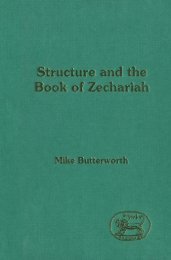Appendix CASE ONE - Collection Point® | The Total Digital Asset ...
Appendix CASE ONE - Collection Point® | The Total Digital Asset ...
Appendix CASE ONE - Collection Point® | The Total Digital Asset ...
You also want an ePaper? Increase the reach of your titles
YUMPU automatically turns print PDFs into web optimized ePapers that Google loves.
Macaulay's 'Utilitarian' Indian Penal Code 153<br />
science. 29 Furthermore, when in India Macaulay was happy to speak of<br />
Bentham as 'that eminent writer . . . from whose opinions on a question<br />
of jurisprudence it is rarely safe to dissent'. 30 And soon after being<br />
informed of his position as head of the Law Commission Macaulay breezily<br />
confided to a friend the 'immense reforms in hand . . . such as would make<br />
old Bentham jump [for joy] in his grave'. 31 Essentially, Macaulay brought<br />
to law-making an attitude which could be aptly described as a 'fusion of<br />
utilitarian clarity and rigour with Burkean pragmatism'. 32<br />
///. <strong>The</strong> Code's Nature, Style and Structure<br />
Although nominally the product of the Law Commission, both Macaulay's<br />
personality and the Indian climate combined to ensure that the Code was<br />
predominantly Macaulay's creation. Work on the Code began in summer 1835,<br />
with the Draft Code and Report being presented to the Governor-General in<br />
October 1837. Macaulay and his team had embarked on their task with high<br />
enthusiasm and hopes of completion within a year. 33 However, of the original<br />
Commission only Macaulay's constitution proved sufficiently robust 34 to stay<br />
the course by resisting capitulation to the severe climate and high sickness<br />
rate; 35 thus making him almost solely responsible for the Code's drafting. 36<br />
<strong>The</strong> Code was remarkable stylistically, structurally and substantively,<br />
marking a radical and express departure from the approach of any English<br />
29<br />
Leslie Stephen, <strong>The</strong> English Utilitarians (1900), ii, 85. And see 'Westminster Reviewer's Defence of<br />
Mill', Edinburgh Review (1829). For the collection of Westminster Review and Edinburgh Review articles<br />
centring around Mill's essay, see Utilitarian Logic and Politics, J. Lively and J. Rees, ed. (Oxford, 1978).<br />
As Leslie Stephen notes, 'Macaulay showed his gratitude for Mill's generosity in regard to the Indian<br />
appointment by declining to republish the [offending] articles' - although they were republished after<br />
Macaulay's death.<br />
30<br />
Governor-General's Council's Legislative Minutes, 11 May 1835; Clive, op. cit., 323.<br />
31<br />
Macaulay to T.F. Ellis, 3 June 1835, Letters, iii, 146.<br />
32<br />
Collini et al., op. cit., 198.<br />
33<br />
Macaulay to T.F. Ellis, 'I begin to take a very warm interest in this work. It is indeed one of the<br />
finest employments of the intellect that it is easy to conceive. I ought however to tell you that the<br />
more progress I make as a legislator the more intense my contempt for the mere technical study of<br />
law becomes', 25 August 1835, Letters, iii, 152.<br />
34<br />
Macaulay to T.F. Ellis: 'I shall have been two years on Indian ground in less than a fortnight, and<br />
I have not taken ten grains of solid or a pint of liquid medicine during the whole of that time', 30 May<br />
1836, Letters, iii, 174-75.<br />
35<br />
Of the climate Macaulay wrote: 'We are annually baked for four months, boiled for four more, and<br />
allowed the remaining four to become cool if we can. At the moment the sun is blazing like a furness: the<br />
earth, soaked with oceans of rain, is steaming like a wet blanket. . . insects and undertakers are the only<br />
living creatures which seem to enjoy the climate', Macaulay to Mrs. T. Drummond, 20 September 1837,<br />
Letters, iii, 225. But the climate was 'beyond all comparison better than that of the House of Commons',<br />
Macaulay to T.F. Ellis, 8 February 1835, Letters, iii, 132.<br />
36<br />
For example, letters of 30 November 1836; 8 March 1837; 18 December 1837; Letters, iii, 202,<br />
210, and 237-38. See also Council Minutes, C.D. Dharker, ed. (1946), 253 and Par/. Papers, xxx<br />
(1852-53), 300.






